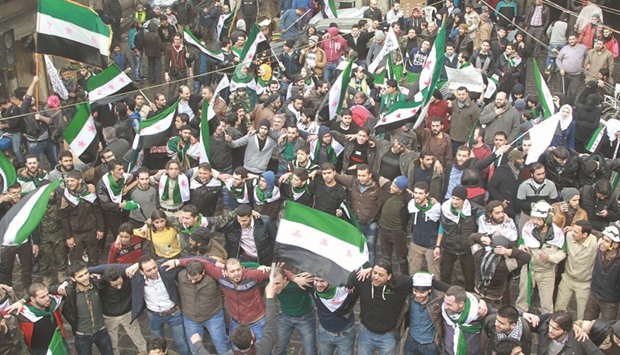Russia’s surprise withdrawal from Syria has boosted the morale of rebels, militants and activists living in opposition-held areas who see the move as a major blow for the Damascus regime.
“Our morale is sky high. The regime will not be able to survive alone,” said Raed al-Elewi, a commander for the Jaish al-Tahrir (Liberation Army) rebel group in Hama province in central Syria.
“This is a victory” for opposition forces seeking the ouster of President Bashar al-Assad, he told AFP. “Russia has not succeeded in fulfilling its goal of saving Assad.”
In Moscow on Monday, President Vladimir Putin ordered the “main part” of Russia’s forces out of Syria, nearly six months after launching a major air campaign in support of ally Assad.
The intervention helped the Syrian army and loyalist militias - exhausted after years of war - to go on the offensive and recapture several areas that they had lost to the armed opposition.
While Moscow claimed its 9,000 combat sorties targeted “terrorists”, the West, its regional allies and activists on the ground insisted it was mainly bombing moderate rebels and even civilian targets.
In Aleppo province, where the regime has made significant advances under Russian air cover, rebel commander Modar Najjar celebrated the announcement.
The Russian withdrawal “shows that they were unable to bring an end to the revolution,” Najjar told AFP via the Internet, adding that the rebels’ morale was “very high”.
“Russia will go down in history as having assisted the killer Bashar (al-Assad) in the past five months, resulting in... civilian deaths and the destruction of dozens of hospitals, schools and other public infrastructure,” said Najjar, a leading commander of the Jabha Shamiya (Levant Front). “The revolution will continue until the fall of the regime.”
According to Thomas Pierret, a Syria specialist at the University of Edinburgh, mainstream rebels will be under Western pressure not to take advantage of the situation despite their elation, as opposition and regime delegations hold indirect peace talks in Geneva.
“For the militants, of course, the temptation to ‘test’ the Russian withdrawal will be extremely hard to resist,” Pierret said.
Syria’s Al Qaeda affiliate Al Nusra Front jumped at the chance to threaten the regime the morning after Putin’s announcement, with a militant commander on the ground vowing to go on the offensive “within the next 48 hours”.
“Had it not been for the Russian warplanes, we would have been in Latakia (city),” he told AFP on condition of anonymity, referring to the provincial capital of the heartland of Assad’s Alawite sect.
Despite the announcement, Russian helicopters yesterday carried out air strikes against militants around the ancient city of Palmyra.
Activists, particularly those living in areas that have come under Russian bombardment, still harbour suspicions about the move.
“Of course there is a sort of happiness, but the Syrian people do not trust the Russians,” said Abu Anas, an activist in Daraa province on the border with Jordan.
Moscow has been a key backer of Assad’s regime since the outbreak of a revolt in 2011 that evolved into a brutal civil war.
The Kremlin has denied that Putin’s latest announcement means Russia is trying to pressure its ally.
“Russia is an enemy... and you should never trust your enemy,” Abu Anas said.
Rebel commander Abu Ibrahim, who leads the rebel 10th Division in Latakia province on the Mediterranean coast, agreed.
“The Russian decision to withdraw was a surprise. We haven’t yet seen what it will mean on the ground. Let’s not get emotional, I don’t see it as a defeat” for Moscow and Damascus, he said.
Abu Ibrahim believes the announcement is linked to the Geneva talks. “I’m very suspicious about what will happen next. Russia won’t give up and withdraw without getting something in return.”
On the other side of the divide, a military officer from the Syrian army admitted he too was surprised by the announcement.
“We don’t know what happened,” he told AFP on condition of anonymity.

Civil defence members, rebel fighters and civilians carry opposition flags and chant slogans during a demonstration marking the fifth anniversary of the Syrian crisis in the old city of Aleppo.
